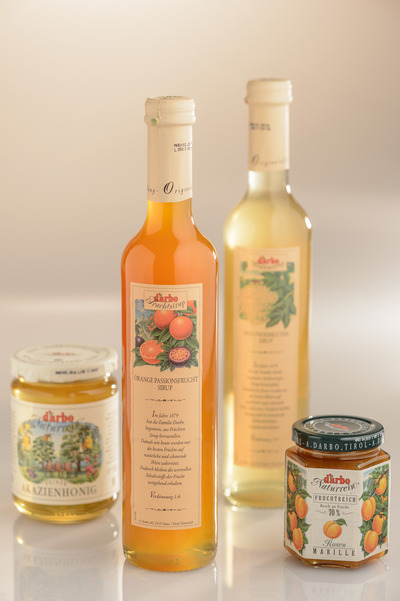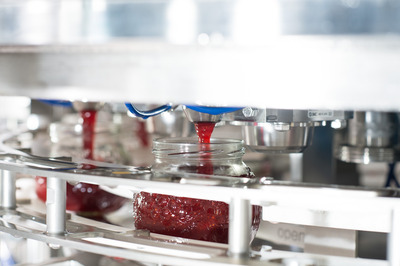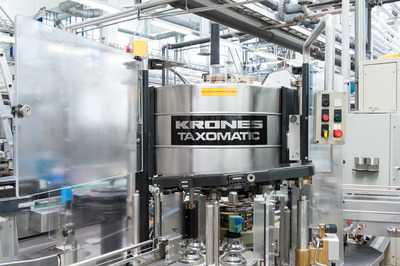Prototype proves its worth
In the tiny town of Stans in the Tyrolean mountains, the A Darbo AG company creates jams and jellies made to centuries-old Austrian recipes and with natural ingredients. Despite the company’s focus on the traditional, its processing practices are anything but: the company became the world’s first food producer to invest in a Viscofill from Krones to fill its premium product into jars.
According to Board Chairman Martin Darbo, jam is by nature a very conservative product, so there’s no need to reinvent the wheel when producing jam.
“We want to get the products to the consumer in as natural a state as possible, because what nature gives us - fruit and sugar - is a perfect food just as it is; you don’t need to mess around with it really,” Darbo said.

In 2012, Darbo achieved a turnover of €117.2 million with a payroll of 300. “We always invest in quality - starting with the raw materials, plus the personnel, all the way through to the kit in our plant,” said Adolf Darbo, Martin’s uncle, who is responsible for the engineering remit on the Board.
Nearly 50% of Darbo’s production output is exported. The high proportion of export is due primarily to an idea that Martin Darbo’s grandfather had: to fill portion packs for the catering trade. Nowadays, the characteristic 28-gram miniature jars can be found in hotels and restaurants around the globe.
In its production operation, Darbo prefers technology that underlines the products’ natural purity. When it came to upsizing filling capacities, the company opted for the Viscofill from Krones. The machine is the prototype of a new filler family developed for viscous, thread-forming foods and those containing chunks.
The machine is a classical piston filler which has a number of design advances that enable it to fill even hard-to-handle products like jam containing large chunks or whole fruit, gently and without dripping. Viscofill reportedly transfers these products into jars undamaged, without leaving behind any splashes of product on the neck finish.

Since the filler’s food and drive areas are hermetically separated from each other, there is no risk that product residues will penetrate the machine. Like the filling function, cleaning of the Viscofill has also been automated, requiring no manual interventions. For this purpose, the filler turret’s components automatically move away from each other until all parts coming into contact with the product are exposed. A tilted table trough made of stainless steel collects flushed-off product residues and cleaning media, and removes everything via a central drain, thus keeping even the floor of the hall clean.
Andreas Kofler, head of the filling operation at Darbo, had already experienced a variety of filler models produced by a number of manufacturers. “The difficult thing is that piston fillers suitable for our application range had hitherto been built solely by relatively small companies,” Kofler said. Selecting a Krones filler was an easy decision. Even though, in 2012, the Viscofill was still in the development phase, Kofler saw it as an opportunity rather than a risk.
“Over the years, we have ourselves accumulated quite a fund of expertise in this regard and we’ve also built a filler in house. We were able to input our empirical findings directly into this project, and we’re admittedly proud of this,” Kofler said.
The Viscofill isn’t the first prototype Darbo has purchased. The company purchased a Taxomatic in 1988, which was developed to put a coated-paper label over the jam jar’s lid like a piece of fabric.
“It took quite a while until we’d finally got the recalcitrant paper to remain stuck to the paraffin film applied to the lid, and not to bounce back up again like a sort of ‘wobbly man’. But once we’d managed it, it’s been running without any problems for 25 years now!” Adolf Darbo remembers.

The company’s miniature jars also feature this label, with the delicate 12 mm-wide labels applied by a labeller from Krones. “As far as labelling is concerned, we work exclusively with Krones machines,” Adolf Darbo said.
Plans are afoot for a follow-up project to the Viscofill, which could see another Krones machine added in the near future.
“Our confidence in Krones was not disappointed. For us, quality is the most important criterion for any investment. And not only do we feel we are being listened to by Krones when we explain our requirements, we’re also certain we’re in good hands with them,” Darbo said
Drawing out mercury: 'active' packaging for canned tuna
Researchers in Sweden have developed a novel packaging technique which has reportedly removed up...
Recyclable cardboard boxes from Visy for Tassal prawns
Visy has developed a purpose-built box for Tassal's prawns, which is recyclable and designed...
Making a mark on the egg carton industry
A fresh egg producer has benefited from using LEIBINGER printers for marking its egg cartons with...











